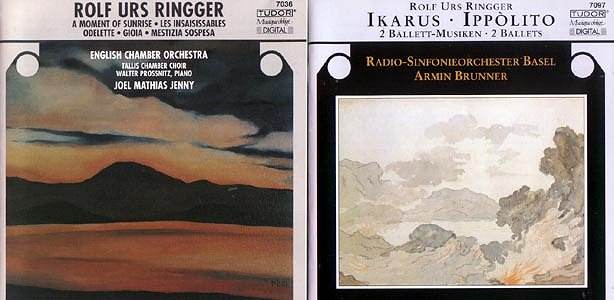 Composer: Rolf Urs Ringger (b. 1935, Zurich)
Composer: Rolf Urs Ringger (b. 1935, Zurich)
Works: Ikarus, Ippolito
Performers: Radio-Sinfonieorchester Basel / Armin Brunner
Label: TUDOR 7097 (Basel Volkhaus 1991/1995)
Duration: [77 mins]
Works: A Moment of Sunrise, Joy, Cuando el fuego, Addio, Dommage que…
Performers: English Chamber Orchestra / Tallis Chamber Choir / Jol Mathias Jenny
Label: TUDOR 7036
Duration: [62.00]
Rolf Urs Ringger’s oeuvre, while not yet widely recognized outside his native Switzerland, emerges as a fascinating fusion of classical themes and contemporary sensibilities. His two recent recordings on the Tudor label provide an illuminating glimpse into his creative world, revealing a composer deeply engaged with narrative and emotion, yet firmly rooted in a tradition that prizes orchestral color and texture.
The first CD offers two ballets centered around Greek mythology—Ikarus and Ippolito. These pieces are significant not merely for their thematic content but for Ringger’s stylistic choices that blend lush orchestration with a meticulous attention to form. The Ikarus ballet is particularly compelling, effectively encapsulating the tragic arc of its titular character. The orchestration is vibrant, with a notable emphasis on bright timbres of the xylophone, vibraphone, and harp. In this work, Ringger deftly utilizes water imagery as a motif, with the orchestral textures evoking the fluidity of the sea while also contrasting with the airy aspirations of Icarus’s flight. Here, the Adagio section serves as a poignant moment of reflection, allowing the listener to absorb the emotional weight of Icarus’s hubris and subsequent fall.
In contrast, Ippolito presents a more elusive narrative. The ’round dance of attraction and repulsion’ that Ringger aims to depict is less effectively realized, at times feeling overly restrained. The potential for vigorous movement is hinted at but ultimately remains unfulfilled, which may leave listeners craving a more kinetic engagement with the score. It is in this comparative analysis that Ringger’s works reveal their dual nature: while Ikarus stands as a vibrant exploration of mythic themes, Ippolito occasionally falters in delivering the emotional immediacy that one might expect from such dramatic source material.
The second CD features a collection of shorter works (1984-1993), showcasing Ringger’s adeptness at conjuring diverse sonic landscapes in a more concise format. “Joy,” for instance, bursts forth with an effulgent brightness, characterized by a scintillating interplay between harp, celesta, and percussion. This work exemplifies Ringger’s ability to evoke the Mediterranean luminosity that he so admires in his Italian surroundings. The rhythmic vitality and delicate orchestration here are reminiscent of Debussy’s explorations of light and color, yet Ringger maintains a distinct voice that is uniquely his own.
“Cuando el fuego,” on the other hand, delves into the multifaceted nature of fire—a theme that resonates deeply in both its literal and metaphorical interpretations. The orchestration here is particularly striking, as it captures the flickering, unpredictable qualities of flames through intricate rhythmic patterns and dynamic contrasts. This piece, along with “Addio,” which grows from the ethereal sounds of tubular bells, demonstrates Ringger’s skillful command of textural layering and thematic development.
A noteworthy aspect of both recordings is their engineering quality. The Tudor label has ensured that the performances are captured with clarity and warmth, allowing the listener to appreciate the nuanced interplay between instruments. The acoustic environment of the Basel Volkhaus and St. Jude’s Church in London contributes to a rich sound that enhances the music’s inherent colors and depth, making both recordings a pleasure to experience.
Historically, Ringger’s music occupies a niche that bridges the worlds of contemporary classical and more traditional narrative forms. His works, while modern in their construction, often hark back to the tonal language of late Romanticism, making them accessible to a broad audience. The absence of an opera commission may, at first glance, seem a limitation; however, it is evident that Ringger’s ballets and shorter orchestral pieces serve as operatic narratives in their own right, rich with emotional and visual storytelling.
In conclusion, Rolf Urs Ringger’s music is a rewarding discovery for those willing to delve into contemporary classical repertoire. These recordings not only illuminate the composer’s extensive range and expressive capabilities but also serve as a reminder of the enduring power of orchestral music to convey complex narratives and emotions. While some works may not always hit their intended mark, the overall exploration of light, emotion, and myth within Ringger’s compositions stands as an engaging contribution to the landscape of modern classical music. For enthusiasts of Swiss contemporary music, these Tudor recordings are indispensable.